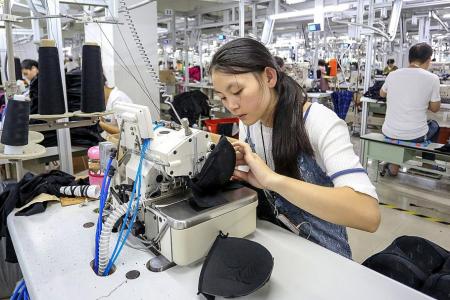China will be able to brush off Trump's tariffs
Falling reliance on exports for growth, dollar's rise against yuan will help Beijing neutralise effects of US trade war
China is fully prepared to win any kind of tariff war that US President Donald Trump can throw at it with some quite simple stratagems that might all be grouped under a single rubric: autocratic capitalism.
After US markets closed on Monday, Mr Trump announced he would impose a 10 per cent tariff on US$200 billion (S$273 billion) worth of Chinese exports to the US - half the level previously contemplated, but still designed to move Beijing toward bilateral talks.
As an added incentive to come to the table, he announced that the figure would surge to 25 per cent at the end of the year, after the US holiday selling season.
Yet, this autocratic capitalism that China has embraced will make it harder for Mr Trump to cause the economic pain that might produce any victory for the White House.
There are key elements of this plan that have received little or no attention in Washington, but that should lead to head-slapping, "ah-ha" moments.
One came to me as I was examining some new equipment for our kitchen.
"I guess we'd better buy this Haier stove before the Chinese tariffs kick in," I observed to our appliance salesman.
Naw, no worries, he smiled. Haier's assured us they won't go up in price.
The store associate may simply have been repeating his company's placatory line.
But the next day, my friend, Mr David Bostwick, a venture capital investor from Silicon Valley and chief financial officer of Crystal Solar, observed that was how China got a strangle-hold on the US solar panel market.
It reduced prices, helping to gut the US solar panel manufacturing industry.
"All the Chinese have to do is cut their prices 20 per cent and they can keep selling their products in the US without any disruption," he observed.
Some of these changes may even make Chinese companies more efficient and, in the long run, more competitive.
At the same time, those companies whose thin margins make them unable or unwilling to slash 10 per cent from their wholesale prices may find other, quite inventive options.
For years, China has been on a determined push to rid itself of a reliance on exports to drive its economic growth.
That has been working.
Exports as a percentage of Chinese gross domestic product (GDP) have fallen every year for the past decade, except for 2009 in the depths of the global recession.
China's entire export sector accounted for just 18.5 per cent of China's GDP last year, down from 35 per cent in 2007.
At the same time, Chinese exports to the US represented just 18 per cent of its total exports last year.
The rising role of China's state-owned enterprises under President Xi Jinping can also be used as a counter against the tariffs, with Beijing able to adjust profit levels at will, keeping vast numbers of workers employed, while potentially devaluing the yuan by 10 per cent as well.
Together with the effect of the dollar's rise against the Chinese currency, this could neutralise most effects of the new Trump tariffs.
In addition, many Chinese privately held companies could profit from the attempted slowdown in American imports from China by increasing marketing and sales to South-east Asia.
That is where economic growth rates are robust and the Organisation for Economic Cooperation and Development predicts "resilient domestic demand" in coming years. This is also true for Africa, where China has been especially active, and Latin America.
Some Chinese companies may move production offshore.
Along the way, there may be a bit of pain.
But many in the Chinese leadership, expecting Mr Trump to lose the 2020 presidential election, or the Democrats to sweep the midterms in November, calculate they can manage until the next administration sheds the tariffs, allowing matters to return to a normal, free market reality.
Of course, Mr Xi does not have to win an election. He is president for life. - REUTERS
The writer is a former foreign correspondent for The New York Times and CBS News.
Get The New Paper on your phone with the free TNP app. Download from the Apple App Store or Google Play Store now



